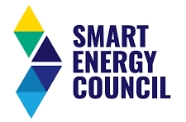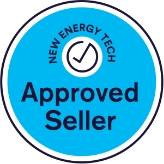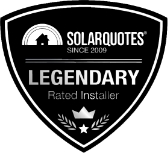Battery ready vs battery compatible
With the announcement of the Tesla Powerwall in 2015, the release of the LG Chem battery and the Fronius storage, being “battery ready” is the talk of the town. Consumers are aiming for a higher level of self-sufficiency and lower power bills. Batteries will revolutionize the industry; there are exciting times ahead. However, it’s also a chance for sales sharks to benefit financially from those not up to speed with current technology.
Misleading sales tactics:
As a consultant, I come into contact with homeowners on a daily basis. It is evident that some ‘salespeople’ will say just about anything to get the sale. It’s frustrating when I’m presenting facts; I find others have been embellishing the truth. From the homeowner’s point of view, they would naturally trust the ‘expert’ on the topic, but there is so much misinformation out there. Unfortunately, it’s consumers that are going to pay the price down the track. True Value Solar played this game only just a few months ago!
Bending the truth!
Here’s an example of how the truth can be stretched. A car salesman calls a used car natural gas ‘compatible’. However, it is not natural gas ‘ready’ until expensive changes have been made.
The same goes for inverters & batteries. Most inverters are battery ‘compatible’, but it will cost a lot more than a couple of hundred dollars to actually make them battery ready.
NON-hybrid inverters being passed off as battery ready:
I have come across several homeowners in the past few weeks that have been misled. The following inverters are being touted as being battery ready: the well-known SMA, Fronius PRIMO (single phase), SolarEdge DC optimisers, and the ABB. Here’s some clarification – NONE of these inverters are hybrids!
- The current SMA model requires the ‘Sunny Island’ charger to be retrofitted to make it battery ready. That’ll set you back $4000. Unless you already have the unreleased new SMA hybrid model, it’s probably not battery ready.
- Fronius currently have the SYMO hybrid which is suitable for properties with three-phase power. The Fronius PRIMO is NOT battery ready. If you only have single-phase power at your property, then you can’t get a Fronius battery-ready inverter. The Fronius PRIMO (single phase) hybrid inverter will not be available until sometime in 2017.
- SolarEdge is compatible with the Tesla Powerwall (as is the Fronius Symo Hybrid). However, it will cost an extra ~$2k to make it Tesla-ready. The StorEdge interface and consumption monitor will need to be retrofitted for the Powerwall.
- The ABB PVI 5.0 is just a standard inverter. Only ABB models that are ‘SCERT’, (or Selectronics Certified) are compatible with the SP Pro inverter charger. While Selectronics are great units, they are generally cost-prohibitive.
True Battery Ready inverters:
Here is a list of well-known true battery-ready inverters. You can literally ‘plug & play’ a battery system into them without having to retrofit expensive additional components:
- SunGrow HYBRID SH5K 5kW model. The Sungrow SG5KTLD is NOT hybrid.
- Fronius SYMO HYBRID – for three-phase power only. Look for the distinctive red-marked Fronius as an indicator of it being a hybrid. The Fronius Primo is NOT battery ready.
- Redback – a serious single-phase solution. Read about the Redback here.
- SolaX – ONLY models SK-SU. The SL-TL models are NOT battery ready. Read why we don’t recommend the SolaX.
- As an AC Coupled solution, systems that are installed with the Enphase Envoy-S Metered gateway would technically be AC battery ready, but before you consider this, read my Enphase review. A better solution for AC coupling would be the sonnenBatterie, however, read my sonnenBatterie review before you consider going down that track.
Tips when looking for a Battery ready system:
- Get a written quote with the exact inverter model so you can do your homework. This way you can ensure you’re going to receive the products you were sold
- Source testimonials from sites such as Solar Quotes, Google, Facebook and other kinds of social media. The easiest way to do this is just to Google “MC Electrical review” (or whichever company you want to check out).
- Check the company has an electrical contractor’s license. If not, then they are using sub-contractors rather than their own electricians.
This often has quality control issues and shows you that you are dealing with a sales company. - Check the companies ABN on ABN Lookup to see if they have been around for more than just a couple of years.
- Check the company’s business address (on Google street view). There are a lot of fly-by companies selling solar from their spare bedroom.
- Install with a CEC Approved Retailer. As a CEC-approved retailer and signatory to the code of conduct, we guarantee an honest sales approach. As the CEC put it, you’ll have; “…peace of mind that the company will adhere to all existing legislation and regulations and that its sales representative will act ethically and not engage in any dishonest or misleading tactics.”
That means we will inform you exactly what the products will & will not do. We won’t mislead you about the capabilities of a product without the addition of extra expensive components. Leave a comment and share your story of a so-called “battery-ready” quote you received! Nicole Tapper: Sales Consultant and Solar Nerd.
Nicole Tapper: Sales Consultant and Solar Nerd.









5 Responses
So can I hook up a goodwe GW5000D-NS inverter to a goodwe 6.6kw battery pack model GoodWe LYNX F G2 High-Voltage Power Control Unit (PCU-F52) thankyou kindly Cheryl
Hi Kevin, we recommend the BYD Battery and Mark has a sizing guide here: http://www.mce.solar/batteryguide
Hi, I had fronius 6.6KW Symo 5.03 + qcell installed on my rooftop 3 phase. Beside tesla pw2 batt, what other batt I can used? Thanks
Hi Lorraine. The new Fronius Gen24 Plus inverters are battery ready!
Hi, i am interested in a Fronius Inverter for single phase power, that is battery ready, for a stand alone system. I have read your review; and noted it’s dated 2016. Please advise me… has Fronius become battery ready since this review?